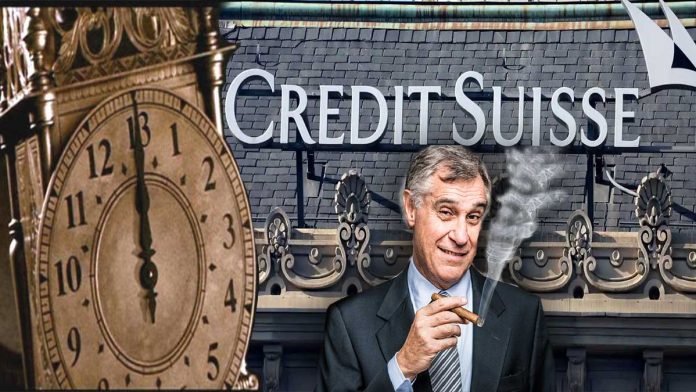UBS to Buy Credit Suisse in Historic Deal in Hopes of Ending Banking Crisis.
As news of UBS’s takeover of Credit Suisse spreads throughout the financial world, there is no shortage of opinions on what this means for the banking industry and the Swiss economy as a whole. But what does this development truly signify, and what can we expect from the new financial landscape that is emerging?
Credit Suisse is one of the world’s largest wealth managers and is one of 30 global banks ranked as systemically important, meaning the deal could ripple through global markets.
It is also one of the largest investment banking employers in the City of London, employing around 5,000 people.
First, it is important to understand the context in which this takeover is occurring. Credit Suisse has been in crisis for some time, with multiple scandals and mismanagement leading to a loss of trust from both clients and investors. In contrast, UBS has weathered the storms of the financial world with relative ease and is currently one of the strongest banks in Europe.
However, the straw that broke the camel’s back for Credit Suisse came after yet another US banking crisis where three major US banks went bust in the last week. There have been efforts and interventions from the US government to stop Financial Contagion from spreading, but these efforts have obviously failed.
The three banks that collapsed in the United States in the span of one week in March 2023: were Silvergate Bank, Silicon Valley Bank, and Signature Bank.
Silicon Valley Bank was the 16th-biggest bank in the country, and the second-largest bank to go under in US history. It had $209 billion in assets and went down in the biggest bank run ever.
Signature Bank was the third-largest bank to collapse in US history, with $118 billion in assets.
In the week between March 8 and March 15, 2023, the Federal Reserve effectively printed a staggering $300 billion to stabilize the banking system – and bail out Silicon Valley Bank’s and Signature Bank’s uninsured depositors.
It is evident that the banking sector remains exposed to vulnerability. As we can see following a turbulent fortnight, the banking industry has once again demonstrated its susceptibility to such phenomena, despite previous assertions of stress testing and preparedness to withstand a financial crisis similar to the 2007/8 event which caused widespread suffering and hardship for over a decade and a half as a consequence of greedy bankers. This susceptibility is inherent to the nature of the industry itself, and while ever bonus are the larger proportion of a banker’s salary it will always be that way.
Bank deposits in the United States are insured up to $250,000 by the US government’s Federal Deposit Insurance Corporation (FDIC), which was created during the Great Depression as part of President Franklin Delano Roosevelt’s New Deal.
More than 93% of the $161 billion in deposits at Silicon Valley Bank (SVB) were above this FDIC limit, however, meaning any amount above $250,000 in those accounts was not insured by the government.
Similarly, 90% of Signature Bank’s deposits were uninsured, surpassing the FDIC limit.
Despite this, the Fed made the depositors whole.
The Associated Press reported that $143 billion of the $300 billion that the Fed printed went to holding companies for Silicon Valley Bank and Signature Bank, which were being managed by the FDIC. (The AP added, “The Fed did not identify the banks that received the other half of the [$300 billion in] funding or say how many of them did so”.)
“The money they borrowed was used to pay their uninsured depositors”, the AP noted.
In doing so, the government has essentially conveyed the message that all deposits in banks in the United States are insured, well above the $250,000 FDIC limit. This encourages depositors to put their money in risky banks that offer much higher rates of interest, like SVB and Signature did.
US President Joe Biden and Treasury Secretary Janet Yellen claimed that the government was not bailing out these banks, but their comments were deeply misleading.
The banks’ shareholders were not technically bailed out, but their wealthy depositors were.
.@DavidSacks tells @jimmy_dore that all the money would have ended up in the hands of the four largest banks if the Federal Reserve didn’t support regional bank depositors:
— kanekoa.substack.com (@KanekoaTheGreat) March 16, 2023
“The person who is licking his chops over this whole thing, who doesn’t want a bailout of the regional… https://t.co/HHbSzl6sge pic.twitter.com/1YfmPyIHd5
The takeover by UBS is seen by many as a lifeline for Credit Suisse, which has been struggling to regain its footing. UBS is a more stable and profitable institution, with a strong reputation for risk management and compliance. By merging with UBS, Credit Suisse will have access to UBS’s resources and expertise, which could help it to turn around its fortunes.
However, there are concerns that the takeover could lead to a concentration of power in the Swiss banking sector, as UBS and Credit Suisse are two of the largest banks in the country. Some experts worry that this could lead to less competition and higher fees for consumers and businesses.
Despite these concerns, the Swiss central bank has stated that it believes the takeover is necessary to ensure the stability of the banking sector. The central bank has also promised to closely monitor the merger to ensure that it does not lead to any negative consequences for consumers or the wider economy.
Overall, the takeover of Credit Suisse by UBS is a significant development in the Swiss banking sector. While it may be met with some resistance, it is clear that the Swiss central bank sees it as a necessary step to ensure the stability and future success of the banking sector. Only time will tell whether this bold move will pay off, but for now, all eyes are on Switzerland’s two largest banks.
It is a precarious situation indeed, where the fate of the masses rests upon the hopeful yet uncertain prospects of an end to the Financial Contagion. The people are acutely aware that the losses of the banks are indistinguishable from their own, and they are cognizant of the habitual inclination of politicians to shield the too big to fail or jail banksters from any meaningful accountability. The knowledge that bailouts bring forth the wretched consequences of austerity, which befall the common people, is a shared understanding amongst us all.
In other words, we will end up paying for their greed.
Support Independent Journalism Today
Our unwavering dedication is to provide you with unbiased news, diverse perspectives, and insightful opinions. We're on a mission to ensure that those in positions of power are held accountable for their actions, but we can't do it alone. Labour Heartlands is primarily funded by me, Paul Knaggs, and by the generous contributions of readers like you. Your donations keep us going and help us uphold the principles of independent journalism. Join us in our quest for truth, transparency, and accountability – donate today and be a part of our mission!
Like everyone else, we're facing challenges, and we need your help to stay online and continue providing crucial journalism. Every contribution, no matter how small, goes a long way in helping us thrive. By becoming one of our donors, you become a vital part of our mission to uncover the truth and uphold the values of democracy.
While we maintain our independence from political affiliations, we stand united against corruption, injustice, and the erosion of free speech, truth, and democracy. We believe in the power of accurate information in a democracy, and we consider facts non-negotiable.
Your support, no matter the amount, can make a significant impact. Together, we can make a difference and continue our journey toward a more informed and just society.
Thank you for supporting Labour Heartlands












